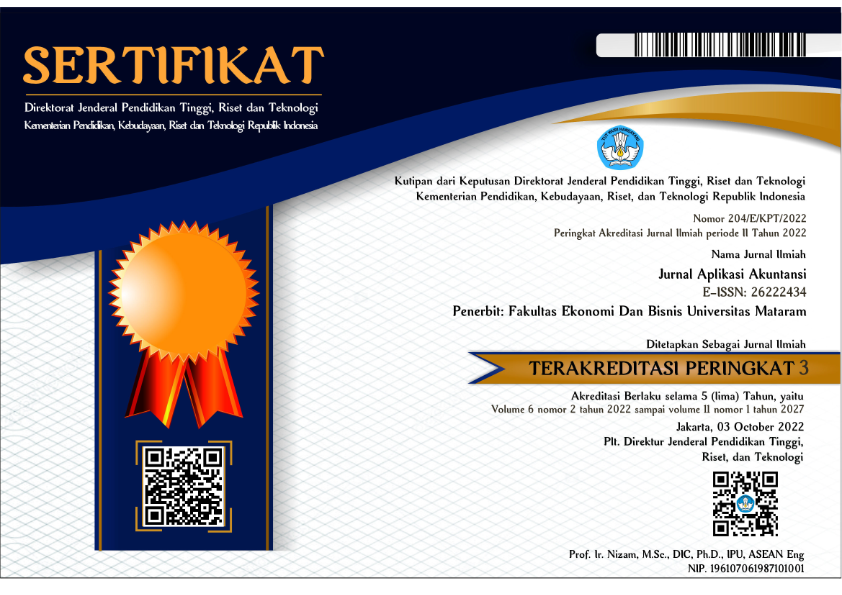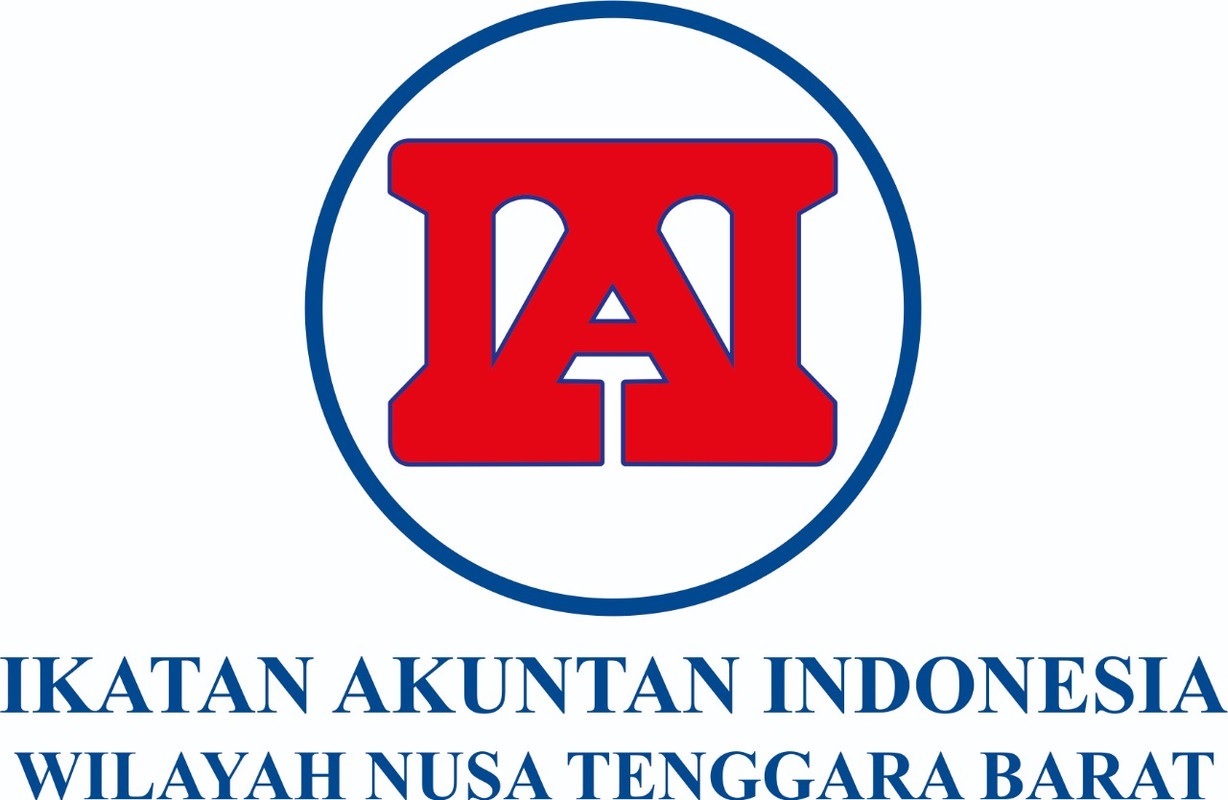ESTABLISHING ENVIRONMENTAL ACCOUNTABILITY THROUGH PUBLIC ACCOUNTING IN THE SDGs AGENDA OF THE GOVERNMENT OF MAKASSAR CITY
DOI:
https://doi.org/10.29303/jaa.v10i1.665Keywords:
Environmental accountability, Government, Legitimacy, Public accounting, SDGsAbstract
This study aims to explore the readiness of the Makassar City Government in building environmental accountability through implementing public sector accounting within the framework of the Sustainable Development Goals (SDGs), while addressing the gap in existing studies related to environmental accounting and the SDGs. Using a qualitative case study approach, data were collected through in-depth interviews, document analysis of the 2021–2026 SDGs Regional Action Plan (RAD SDGs), and participatory observation. The findings reveal that although Makassar City has established a relatively well-structured SDGs planning framework and demonstrated initial commitment through budgeting and strategic programs, the budget allocation for environmental issues remains limited, approximately 3% compared to other sectors. This highlights a legitimacy gap between the city's green rhetoric and the actual implementation of fiscal policy. The lack of community and external stakeholder involvement hinders participatory and sustainable governance. This study recommends the integration of environmental accounting into public decision-making and strengthening substantive accountability principles to address transparency and legitimacy challenges in local SDG implementation.
References
Abhayawansa, S., Adams, C. A., & Neesham, C. (2021). Accountability and governance in pursuit of Sustainable Development Goals: conceptualising how governments create value. Accounting, Auditing and Accountability Journal, 34(4), 923–945. https://doi.org/10.1108/AAAJ-07-2020-4667
Amirya, M., & Irianto, G. (2023). TANTANGAN IMPLEMENTASI SUSTAINABLE DEVELOPMENT GOALS (SGDs) DI INDONESIA. Jurnal Ilmiah Akuntansi Peradaban, 9(1), 187–198. https://doi.org/10.24252/jiap.v9i1.38916
Deegan, C. (2017). Twenty five years of social and environmental accounting research within Critical Perspectives of Accounting: Hits, misses and ways forward. Critical Perspectives on Accounting, 43, 65–87. https://doi.org/10.1016/j.cpa.2016.06.005
Ekaputra, A. A., Febrianti, A., Muntaha, A. Y., Trianita, D., & Susanti, P. (2025). DAMPAK DESENTRALISASI TERHADAP HUBUNGAN PEMERINTAH PUSAT DAN PEMERINTAH DAERAH. Jurnal Hukum dan Kewarganegaraan, 12(13), 1–1.
Freeman, R. E. (1984). Strategic Management : A Stakeholder Approach. Pitman.
Hadi Zuherman, N., Islam Negeri Raden Intan Lampung Alamat, U., Letnan Kolonel Jl Endro Suratmin, J. H., Sukarame, K., & Bandar Lampung, K. (2025). Peran Akuntansi Lingkungan dalam Mendukung Tujuan Pembangunan Berkelanjutan (SDGs): Tinjauan Literatur Ersi Sisdianto. Jurnal Ilmiah Ekonomi Bisnis Dan Akuntansi, 2(1), 433–443. https://doi.org/10.61722/jemba
Haikal, M. F., & Mauliana, D. (2022). PUBLIC SERVICE ACCOUNTABILITY AND TRANSPARENCY (CASE STUDY OF e-KTP SERVICE IN TALLO DISTRICT OFFICE MAKASSAR CITY. Jurnal Administrasi Negara, 28(1), 89–112.
Halim, A. (2012). Akuntansi Sektor Publik ; Akuntansi Keuangan Daerah (Empat). Salemba Empat.
Zen, N. H., & Mageiasti, L. (2025). Analisis Penerapan SDGs dalam Pembangunan Berkelanjutan di Indonesia : Tinjauan Literatur dan Tantangan Implementasi. Januari, 3(1), 775–785. https://doi.org/10.59435/gjmi.v3i1.1316
Hidayah, N., Habbe, H., & Pagalung, G. (2024). Halaman | 334 MENGINTEGRASIKAN NILAI ETIKA LINGKUNGAN DALAM AKUNTANSI : TINJAUAN FILSAFAT ILMU DAN IMPLIKASINYA BAGI KEBERLANJUTAN. https://e-jurnal.nobel.ac.id/index.php/akmen
Judijanto, L., Damanik, F. H. S., Kusnadi, I. H., Ahmadun, & Leuwol, N. V. (2021). ANALISIS PARTISIPASI MASYARAKAT DALAM PENGAMBILAN KEPUTUSAN PUBLIK: MENILAI EFEKTIVITAS MODEL KETERLIBATAN WARGA. Jurnal Cahaya Mandalika, 1, 1779–1787.
Kamilah, R. (2024). Peran literasi digital dalam mencapai SDGs 2030 sebagai upaya pemberdayaan masyarakat berkelanjutan. In Maliki Interdisciplinary Journal (MIJ) eISSN (Vol. 2, Issue 6). http://urj.uin-malang.ac.id/index.php/mij/index
Kiwanuka, M., Kateshumbwa, E. M., & Andama, F. A. (2022a). Reflecting on Implementation from the Perspective of the Public Value Theory: The Context of SDGs in Uganda’s Local Government System. Open Journal of Social Sciences, 10(06), 241–255. https://doi.org/10.4236/jss.2022.106019
Kiwanuka, M., Kateshumbwa, E. M., & Andama, F. A. (2022b). Reflecting on Implementation from the Perspective of the Public Value Theory: The Context of SDGs in Uganda’s Local Government System. Open Journal of Social Sciences, 10(06), 241–255. https://doi.org/10.4236/jss.2022.106019
Lauwo, S. G., Azure, J. D. C., & Hopper, T. (2022). Accountability and governance in implementing the Sustainable Development Goals in a developing country context: evidence from Tanzania. Accounting, Auditing and Accountability Journal, 35(6), 1431–1461. https://doi.org/10.1108/AAAJ-10-2019-4220
Makanga, C. N., Orobia, L. A., Kaawaase, T. K., Nabeta, I. N., Katoroogo, R. M., & Munene, J. (2024). Enhancing public accountability in a city authority. Journal of Work-Applied Management. https://doi.org/10.1108/JWAM-10-2023-0111
Mareta, F. C., & Firdaus. (2024). MEKANISME AKUNTABILITAS PELAYANAN PUBLIK. JIASK, 6(2), 231–240.
Melo, R. H., Moko, F., & Saleh, S. E. (2024). Tantangan Pembangunan Sumberdaya Alam di Indonesia: Dampak Lingkungan dan Ekonomi dalam Pencapaian Keberlanjutan. Jurnal Penelitian Geografi (GeoJPG), 3(2), 149–154. https://doi.org/10.37905/geojpg.v3i2.29544
Nike Mutiara Fauziah, & Lubis, R. K. (2022). Sound Governance: Model Kolaborasi Multilevel sebagai Upaya Pencegahan Korupsi dalam Pemerintahan Desa. Jurnal Ilmu Administrasi Negara ASIAN (Asosiasi Ilmuwan Administrasi Negara), 10(2), 440–451. https://doi.org/10.47828/jianaasian.v10i2.115
Ningrum, D., Raven, R., Malekpour, S., Moallemi, E. A., & Bryan, B. A. (2023). Transformative potential in sustainable development goals engagement: Experience from local governance in Australia. Global Environmental Change, 80. https://doi.org/10.1016/j.gloenvcha.2023.102670
OECD. (2010). OECD Factbook 2010. OECD Publishing. https://doi.org/10.1787/factbook-2010-en
Pratama, B. H., & Kurniati, E. (2025). GOOD GOVERNANCE DALAM MANAJEMEN PEMBANGUNAN DAERAH (Studi Kasus Tulang Bawang). IJEN, 3(2), 200–210.
Putra, J. M., Sembiring, M., & Habeahan, L. (2022). Penerapan Akuntansi Sektor Publik, Ketidakpastian Lingkungan Kerja, Pengawasan Sistem Pengendalian Internal, Kualitas Laporan Keuangan, Kejelasan Sasaran Anggaran Terhadap Penerapan Transparansi Pelaporan Keuangan Pemerintah Daerah. Jurnal Doktor Manajemen, 5(2), 137–145.
Ríos, A. M., Guillamón, M. D., & Benito, B. (2024). The influence of local government transparency on the implementation of the sustainable development goals in municipalities. Journal of Public Budgeting, Accounting and Financial Management, 36(4), 417–444. https://doi.org/10.1108/JPBAFM-12-2023-0229
Rodrigue, M., & Romi, A. M. (2022). Environmental escalations to social inequities: Some reflections on the tumultuous state of Gaia. Critical Perspectives on Accounting, 82. https://doi.org/10.1016/j.cpa.2021.102321
Romer, D. (2001). Advanced Macroeconomics. McGraw-Hill.
Setiawan, D., Rahmawati, I. P., & Santoso, A. (2023). A bibliometric analysis of evolving trends in climate change and accounting research. Cogent Business and Management, 10(3). https://doi.org/10.1080/23311975.2023.2267233
Shahib, H. M., Sukoharsono, E. G., Achsin, M., & Prihatiningtias, Y. W. (2020). Developing Local Government’s Socioenvironmental Accountability: Insights from Indonesian Socioenvironmental NGOs’ Annual Reports (pp. 27–54). https://doi.org/10.1108/s1479-359820200000009003
Silva, A. F., Sánchez-Hernández, M. I., & Carvalho, L. C. (2023). Local Public Administration in the Process of Implementing Sustainable Development Goals. Sustainability (Switzerland), 15(21). https://doi.org/10.3390/su152115263
Sinervo, L. M., Vikstedt, E., Luhtala, M., Laihonen, H., & Welinder, O. (2024). Fostering sustainability in local government: The institutional work perspective on the accounting–management nexus. Financial Accountability and Management. https://doi.org/10.1111/faam.12399
Suchman, M. C. (1995). Managing Legitimacy: Strategic and Institutional Approaches. The Academy of Management Review, 20(3), 571. https://doi.org/10.2307/258788
Tetteh, L. A., Agyenim-Boateng, C., & Simpson, S. N. Y. (2023). Institutional pressures and strategic response to auditing implementation of sustainable development goals: the role of public sector auditors. Journal of Applied Accounting Research, 24(2), 403–423. https://doi.org/10.1108/JAAR-05-2022-0101
UNDP. (2016). The Sustainable Development Goals Report.
Wicaksono, A. P. N. (2023). Eksplorasi Sustainable Development Goals (SDGs) Disclosure Di Indonesia. Jurnal Akademi Akuntansi, 6(1), 125–156. https://doi.org/10.22219/jaa.v6i1.26448
Downloads
Published
How to Cite
Issue
Section
License
Copyright (c) 2025 Nur Hidayah, Haliah Imran, Nirwana

This work is licensed under a Creative Commons Attribution-ShareAlike 4.0 International License.









